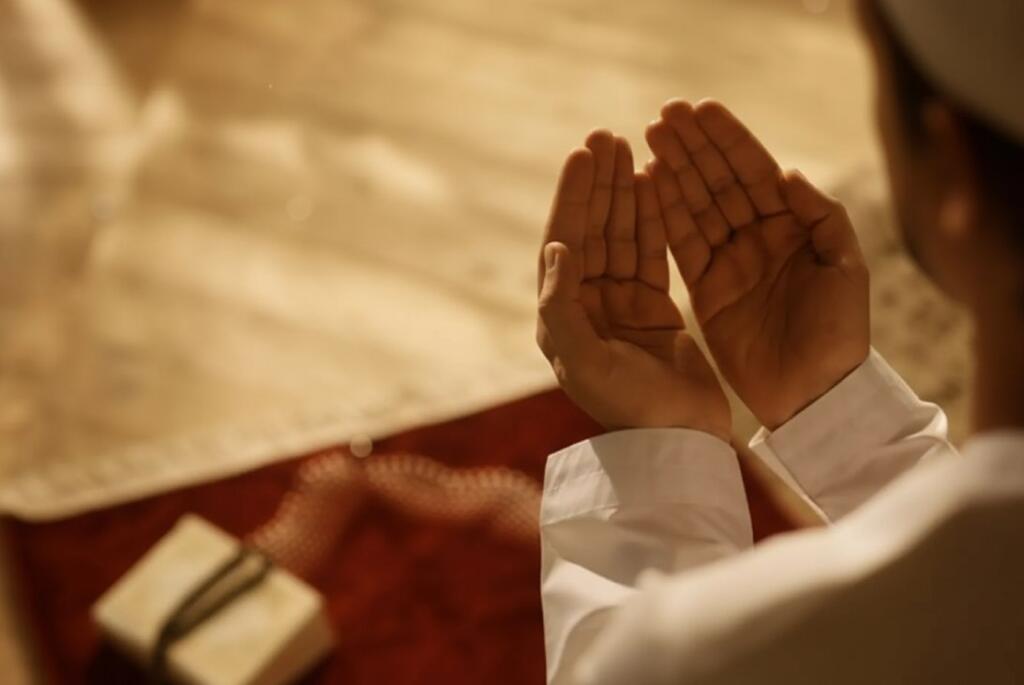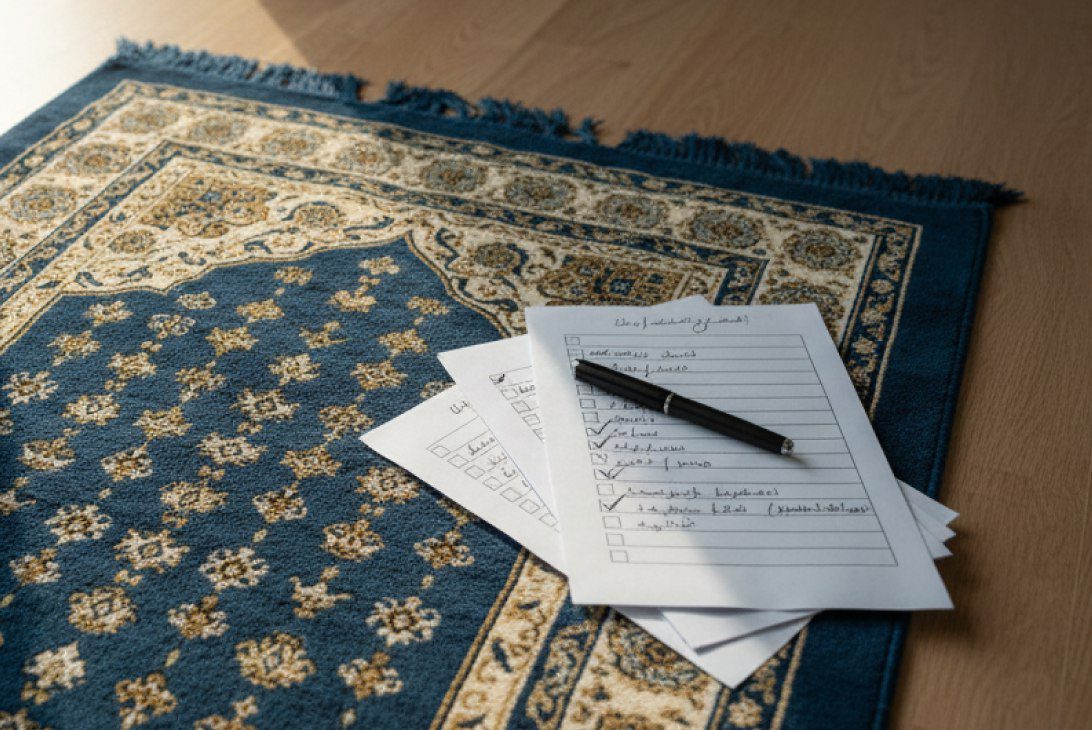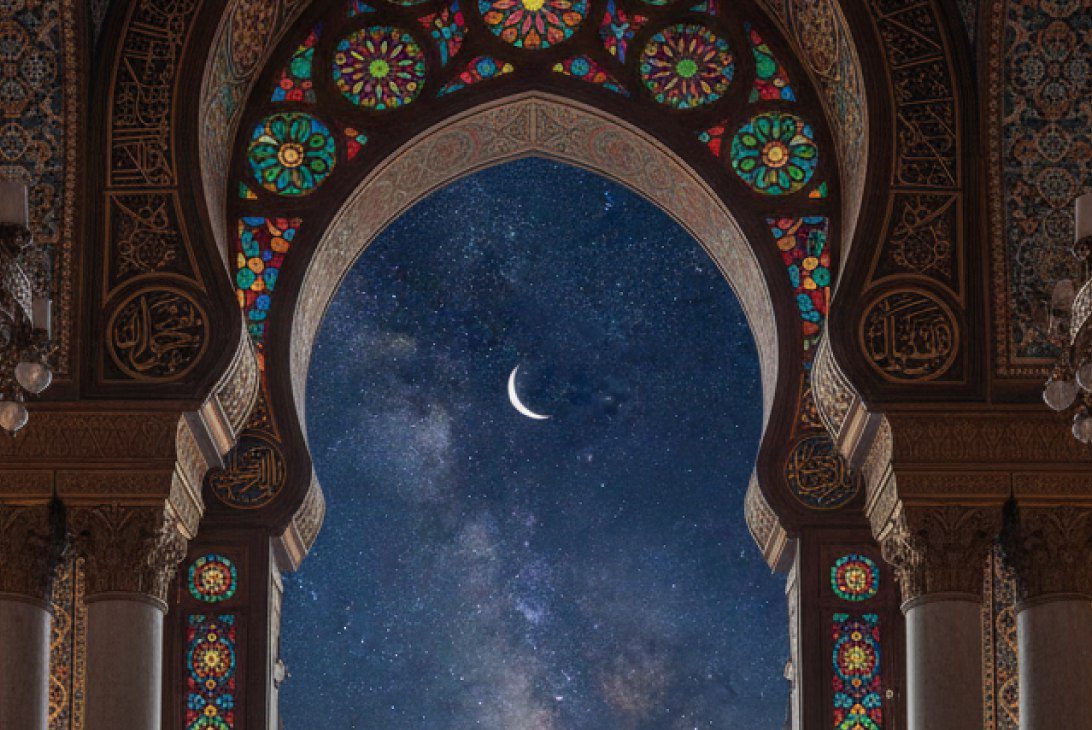Subtotal: £5.00
Although Allah accepts duʿāʾ at all times, there are certain blessed times and occasions when duʿāʾ is more readily accepted by Allah al-Karīm (The Most Generous), and the reward of supplication is multiplied. During these precious moments, increase your supplications to your Most Loving Lord:
1. Between Adhan & Iqamah
The Messenger of Allah ﷺ said, “Duʿā’ is not rejected between the adhān and the iqāmah” (Tirmidhī).
Sadly, this golden opportunity is often overlooked, despite how simple it is to seize. Make the most of this blessed daily moment, and don’t miss the chance for your duʿāʾ to be accepted.
2. Whilst in Sujud
The Messenger of Allah ﷺ said, “The closest a slave is to his Lord is when he is prostrating, so make plenty of duʿā’” (Muslim). He ﷺ also said, “As for sujūd, go to great lengths in making duʿā’ in it, as it is likely that your duʿā’ shall be answered” (Muslim).
Sujūd is one of the best and most honoured times to make duʿā’. Pour your heart out to Allah in sujūd and cry out of fear of Him. Make duʿā’ for everything, be it minor or major. Be selfless and make duʿā’ for your family, friends and the ummah. Be like Abū al-Dardā’ (raḍiy Allāhu ʿanhu) who said, “Indeed I make duʿā’ for thirty of my brothers whilst I am in sujūd, with their names and their fathers’ names.”
Ibn al-Qayyim (raḥimahullāh) said, “Sujūd is the secret of prayer, its greatest pillar, and the conclusion of each rakʿah. Everything before it serves as a preparation for it. That is why the servant is closest to his Lord while in sujūd. This position represents the highest state of nearness to Allah — and thus, duʿāʾ made in sujūd is more likely to be answered.”
3. At the End of the Obligatory Prayers
The Prophet ﷺ was asked, “Which duʿā’ is most likely to be responded to?” He replied, “During the last part of the night and at the end of the obligatory prayers” (Tirmidhī).
‘End of the obligatory prayers’ can refer to either just before the salām or just after it, and scholars have interpreted it both ways. Duʿā’ after obligatory prayers is recommended, but it is best made after completing the prescribed sunnah adhkār.
How Kind and Generous is Allah ﷻ! Every time one of the five daily prayers begins, He opens the gates of heaven and listens to the supplications of His servants, from the adhān until the prayer ends!
4. When One Awakens At Night
The Messenger of Allah ﷺ said, “Whoever gets up at night and says:
لَا إِلٰهَ إِلَّا اللّٰهُ وَحْدَهُ لَا شَرِيْكَ لَهُ ، لَهُ الْمُلْكُ ، وَلَهُ الْحَمْدُ ، وَهُوَ عَلَىٰ كُلِّ شَيْءٍ قَدِيْرٌ ، اَلْحَمْدُ لِلّٰهِ ، وَسُبْحَانَ اللّٰهِ ، وَلَا إِلٰهَ إِلَّا اللّٰهُ ، وَاللّٰهُ أَكْبَرُ ، وَلَا حَوْلَ وَلَا قُوَّةَ إِلَّا بِاللّٰهِ
and then says: ‘O Allah, forgive me’ or makes duʿā’, it will be accepted. If he performs wuḍū’ and prays, his prayer will be accepted” (Bukhārī).
Ibn Baṭṭāl (raḥimahullāh) said, “Whoever hears this ḥadīth should seize the opportunity to act upon it and purify their intention solely for their Lord.”
The Messenger of Allah ﷺ said, “No Muslim goes to sleep in a state of remembrance of Allah and in a state of purity, then wakes up during the night and asks Allah for anything of the good of this world and the hereafter, except that He will grant it to him” (Abū Dāwūd).
5. The Last Third of the Night
The Messenger of Allah ﷺ said: “Our Lord – Glorified and Exalted is He – descends every night to the lowest heaven when one-third of the night remains and says: ‘Who will call upon Me, that I may answer Him? Who will ask of Me, that I may give him? Who will seek My forgiveness, that I may forgive him?’” (Bukhārī). He ﷺ was asked, “Which duʿā’ is most likely to be responded to?” He replied, “During the last part of the night…” (Tirmidhī).
Imām Ghazālī (raḥimahullāh) explained that the honour of certain times is connected to the spiritual state of the heart. The pre-dawn hours are particularly sanctified because the heart is pure, more sincere and free from distractions at this time.
Use this blessed time to pour your heart out to Allah. Be persistent in your duʿā’, and do not withhold your tears. Ask for everything: big or small. Ibn al-Jawzī (raḥimahullāh) said, “When you sit in the darkness of the night before your Master, adopt the qualities of a child. For when a child asks their father for something and does not receive it, they cry for it.”
Whoever gives up something for the sake of Allah, He compensates them with something far better. So, if you forsake sleep, comfort, and a soft bed to sincerely commune with your Lord, Allah rewards you with acceptance of your duʿā’, acceptance of your repentance, forgiveness of your sins and relief from your distress.
“The person who has a need from Allah, and then fails to (ask Allah for it) in the pre-dawn hours — is not a smart person.” – Imām al-Ṭarṭūshī (raḥimahullāh)
6. The Last Portion of the Day of Jumuʿah
The Messenger of Allah ﷺ said, “Jumuʿah is comprised of twelve portions of time. There is one in which a Muslim who asks Allah for something will have it granted to him. Seek it in the last portion after ʿaṣr” (Abū Dāwūd).
Be eager to seize these moments for their blessings are beyond what any mind can comprehend. The pious predecessors would give great importance to this time. When Mufaḍḍal b. Fuḍālah (raḥimahullāh) would perform the ʿaṣr ṣalāh on Jumuʿah, he would seclude himself in the corner of the masjid and continuously supplicate until sunset.
One of the righteous said: “I have never made a duʿā’ between ʿaṣr and maghrib on a Jumuʿah without my Lord answering me…”
7. The Day of ʿArafah
The Messenger of Allah ﷺ said, “The best duʿā’ is the duʿā’ of the Day of ʿArafah” (Tirmidhī).
Retreat from the world and its distractions on this special day, and let your soul ascend up to the heavens. Experience the sweetness of intimately conversing with Allah, humbling yourself and crying to Him. Turn to Him with full sincerity and beg Him to forgive you.
Imām al-Nawawī (raḥimahullāh) wrote: “It is mustaḥabb to perform dhikr and duʿā’ in abundance, and to exert oneself in this. This is the best day of the year for duʿā’…It is essential that one devotes every effort to doing dhikr, making duʿā’, reciting Qur’ān, supplicating with various supplications and performing a variety of adhkār… He should make duʿā’ for himself, his parents, his relatives, his teachers, his companions, friends and loved ones, all those who have done good to him, and all the Muslims. He should be extremely careful not to neglect any of these, because he will not be able to make amends for it, unlike other acts.”
One of the pious predecessors said: “I have been making duʿā’ on the Day of ʿArafah for the last 50 years, and not a year passes by except that I see them (answered) as clearly as the light of the morning.”
8. When Holding onto the Multazam
The Multazam is the area between the Black Stone and the door of the Kaʿbah, a place of deep humility and heartfelt prayer. The Prophet ﷺ would press his face and chest against it. Ibn ʿAbbās (radiy Allāhu ʿanhumā) said, “No one clings to this place and asks Allah for anything, except that Allah grants it to them” (Bayhaqī).
Clinging to the covering of the Kaʿbah is like a desperate plea for forgiveness and protection, just as a wrongdoer might grasp the clothes of the one he has wronged, refusing to let go until he is pardoned. At the Multazam, you stand as a humble servant, broken and hopeful, knowing that you will only be released when He forgives and pardons you.
9. When it Rains
The Messenger of Allah ﷺ said: “Two supplications are not rejected: at the time of adhān and under rain” (Ḥākim).
The scholars explain that duʿāʾ is accepted during rainfall because it is a time when Allah’s mercy descends and His bounty is generously distributed.
Do not miss out on this great opportunity. Eagerly raise your hands and ask Allah for whatever bounty and mercy you desire, for this is truly a time of generosity and giving.
This principle isn’t limited to rain. Whenever you witness or hear of a blessing being given to anyone, raise your hands and ask Allah for His bounty. That’s exactly what Prophet Zakariyyā (ʿalayhis-salām) did when he found summer fruits with Maryam (ʿalayhas-salām) during winter. Upon realising it was from Allah’s generosity, he immediately turned to his Lord with full certainty and hope, and asked for righteous offspring.
10. At the Crowing of a Rooster
The Prophet ﷺ said, “When you hear the crowing of a rooster, ask Allah for His bounty, for indeed it has seen an angel. And when you hear the braying of a donkey, seek refuge in Allah from Shayṭān, for it has seen a devil” (Bukhārī).
Allah ﷻ has granted animals and birds a perception that surpasses human senses. Through this, they may sense things unseen by humans, and their reactions serve as signs, either glad tidings or warnings for believers.
The rooster has a unique ability among creatures: it instinctively knows the time during the night and crows with precise intervals before and after fajr, rarely making a mistake regardless of the night’s length. This is a special gift from Allah.
11. When Visiting the Sick
The Prophet ﷺ said, “When you visit a sick person, say good words, for the angels say Āmīn to what you say” (Muslim).
Imām al-Nawawī (raḥimahullāh) said, “It is recommended to speak good words in such moments, such as making duʿāʾ for the person, asking Allah to forgive them, to be gentle with them, to ease their pain, and similar supplications. It also affirms that angels are present at that time and respond with Āmīn to those words.”
12. When the Soul Is Taken
The Prophet ﷺ entered upon Abū Salamah (raḍiy Allāhu ʿanhu) after his soul had been taken and his eyes had become fixed. The Prophet ﷺ then closed his eyes and said, “Indeed, when the soul is taken, the eyesight follows it.” Some of his family began to cry out, so he ﷺ said, “Do not supplicate for yourselves except with good, for the angels say Āmīn to what you say” (Muslim).
The Prophet ﷺ, as a teacher and murabbī, here showed us how to remain patient during loss. He taught us to avoid wailing and instead say good words: praying for the deceased with mercy, as he ﷺ did for Abū Salamah (ra). He explained that angels say Āmīn to our duʿā’, whether good or bad, so we must never make harmful supplications.

 My Dhikr Companion - Hardback
My Dhikr Companion - Hardback 




